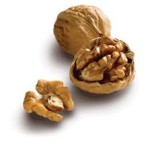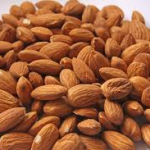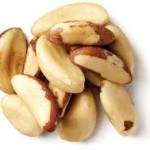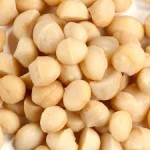Nuts Are Part of A Healthy Diet
Recipe Key
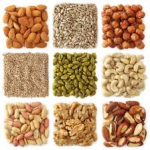 One of the most common questions I get from my clients and readers is “What is a good snack?” Often I say nuts or seeds. Nuts are great for keeping your blood sugar in balance which will give you sustained energy throughout the day. This will support your adrenals and reduce your cravings. The next question I get is “Aren’t nuts fattening?” Let me answer both of those questions.
One of the most common questions I get from my clients and readers is “What is a good snack?” Often I say nuts or seeds. Nuts are great for keeping your blood sugar in balance which will give you sustained energy throughout the day. This will support your adrenals and reduce your cravings. The next question I get is “Aren’t nuts fattening?” Let me answer both of those questions.
Nuts and Seeds – A Healthy Snack
Nuts and seeds are a quick and easy snack to bring along on a hike or to have at your desk when you need a little something. Nuts are packed with heart-healthy fats, protein, and disease-fighting vitamins, fiber and minerals like magnesium.
There is evidence showing that the consumption of a variety of nuts can help to lower cholesterol levels and prevent cardiovascular disease. Remember good fats are good for your body. A recent study involving more than 13,000 people, published in the Journal of the American College of Nutrition, revealed that nut eaters gain several health benefits compared to non-nut eaters, “including lower weight and systolic blood pressure, decreased waist circumference, and a lower risk of diabetes and metabolic syndrome.”
Will Eating Nuts Make You Fat?
It’s one of the biggest nutritional myths of all times that eating a food high in healthy fats will make you fat. The truth is actually the opposite. You need healthy fat to burn fat. Healthy fats turn on the genes telling your body to use fat for fuel, not storage. Healthy fats give you sustained energy, not the highs and lows of carbohydrates. Even if you’re watching your weight, a small handful of nuts like almonds is a better snack choice than a snack high in complex carbohydrates, such as popcorn.
Eating Nuts in Moderation is Best
Even though they are loaded with vitamins and minerals you need keep your nut consumption to a minimum. This is because almost all nuts are high in omega-6 fats that can upset your Omegat-6/omega-3 ratio. Many nuts have a fairly high Poly Unsaturated Fatty Acid ( PUFA) content, and most of that PUFA is Omega-6,. In a healthy diet you want to strive to balance omega-6 and omega-3 intake to obtain a ratio as close to 1:1 as possible. PUFA’s are easily oxidized, highly unstable for cooking, easily go rancid on the shelf.
When eating a small amount of nuts, the positives of the nuts seem to outweigh the negatives. Eating raw nuts reduces inflammation and balances blood sugar making them highly beneficial for our health.
Are nuts good for everyone?
I like nuts but only in limited quantities. I am one of those people who have digestive troubles if I eat too many nuts, by that I mean, gas, bloating and weight gain. The funny thing is once I start eating nuts it is hard for me to stop. Does that happen ever happen to you? I actually do better with seeds. I prefer to eat sunflower seeds or pumpkin seeds when I need something for my blood sugar. It is easier for me to not overdo those. If you have trouble digesting nuts you may think about how you eat nuts rather than the complete elimination of nuts.
For some people, sprouting nuts, which involves soaking them and then, possibly dehydrating them to re-institute their crunch, is the only way the goodness of the nuts can be received without digestive distress. Another great way to get the nutrition from nuts without additional stress on your digestive system is to make nut milks. Almond milk is my favorite. It is sweet and delicious.
Nuts are also one of those foods which can cause allergic reactions in certain people. Some people are sensitive to specific nuts but not others.
Raw Nuts vs Roasted Nuts
I generally like to consume raw nuts. All nuts contain enzymes which are good for you and enzyme inhibitors which can prevent the full digestion of the proteins in them. Roasting kills them both. But sprouting nuts kills only those inhibitors while activating the enzymatic activity we want. It is the enzymes that help get the nutrients from the nuts to our cells for energy. Consider raw or sprouted nuts to get the most amount of nutrients.
Many health food stores now carry sprouted dehydrated nuts which removes the enzyme inhibitors and restores their natural crunchiness . .
Roasted nuts are very popular. Unfortunately many nuts are roasted in canola oil which is not a good fat, especially when heated. Even if your nuts are dry roasted their good fats which are highly reactive can become bad fats under high heat. To get the most health benefits from your nuts, consider raw or sprouted nuts, as discussed above, not roasted nuts and salted nuts, especially those that have added oils or sugar.
Store your nuts in tightly sealed glass containers in a cool dark place to prevent the oils from going rancid. I keep them in the refrigerator to keep their nutty goodness.
What are the best nuts to eat?
Most nuts are fine for you as long as you choose organic, raw nuts. My favorites are almonds, walnuts, brazil nuts, macadamia and pecans . Generally speaking, each type of nut will offer a slightly different mix of nutrients for your health.
It is important to note pistachios and cashews have more carbohydrates than the other nuts. So if you are trying to lose weight or are concerned about your insulin levels choose one of the other types.
 Walnuts
Walnuts
They are a great source of the healthy omega-3 essential fatty acids which is good for your brain. They even look like your brain. The downside is they also have a high amount of omega 6’s (see chart below). Walnuts are incredibly healthy for the heart as they have a high level of vitamin E in the form of gamma-tocopherol. They are high in anti-inflammatory compounds which can be beneficial for asthma, rheumatoid arthritis, eczema and psoriasis. They contain 183 calories per ounce.
 Almonds
Almonds
One of the lowest calorie nuts, 161 calories per ounce. They are one of the healthiest nuts. A quarter cup of almonds has almost as much calcium as a quarter cup of milk and contains nearly 25 percent of your needed daily value of the important nutrient magnesium. They are rich in antioxidants including phenols, flavonoids and phenolic acids, which are typically associated with vegetables and fruits. Almonds are moderately high in omega-6. (see chart below)
 Brazil Nuts
Brazil Nuts
These nuts are extremely nutrient-rich. They are an excellent source of selenium. Selenium is a powerful antioxidant that works to neutralize dangerous free radicals which prevents cancer. Selenium is an extremely important nutrient that’s lacking in many people’s diet. It’s a crucial antioxidant and is very beneficial for the thyroid gland. Selenium is so important that it you may want to eat a few brazil nuts regularly even though they are high in total PUFA. They contain 184 calories per ounce
 Macadamia Nuts
Macadamia Nuts
Raw macadamia nuts are a powerhouse of a nut. Macadamia nuts are low in total PUFA compared to other nuts, most of their fat being monounsaturated. The amount of total PUFA is low enough that the omega-6/omega-3 ratio is not a concern here. They contain a wide variety of critical nutrients including high amounts of vitamin B1, magnesium, manganese and healthful monounsaturated fat. I love them because they taste great and the monounsaturated fats are very stable, they don’t go rancid very quickly. They are relatively low in carbs. They contain 201 calories per ounce.
 Pecans
Pecans
Pecans are an excellent source of over 19 vitamins and minerals. The best feature of pecans is research has shown they may help lower LDL cholesterol and promote healthy arteries. They contain 193 calories per ounce.
A Word on Peanuts
I don’t eat peanuts. Peanuts aren’t even nuts, technically they are in the legume family but that isn’t the problem. The biggest issue is they are highly sprayed with pesticides. In addition most peanut are contaminated with aflotoxin a carcinogenic mold . They are also very had to digest so they sit in your intestines fermenting making your system toxic.
Omega-6 Content Various Nuts (1/4 cup)
Walnuts – 9.5 g
Almonds – 4.36 g
Cashews – 2.6 g
Macadamias – 0.5 g
Brazil nuts – 7.2 g
Hazelnuts – 2.7 g
Pistachio – 4.1 g
Pine nuts – 11.6 g
Pecans – 5.8 g
In conclusion, nuts are part of a healthy diet. They are loaded with vitamins and minerals, but nuts and seeds should be kept to a minimum. In other words don’t go nuts!

